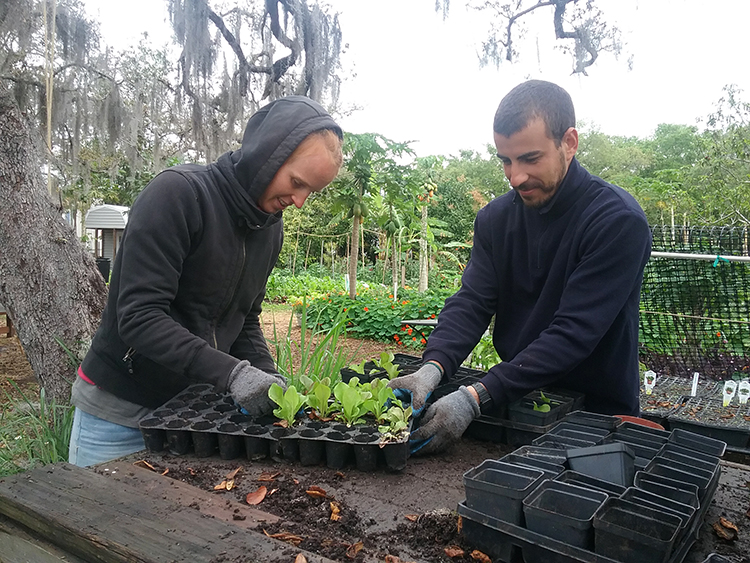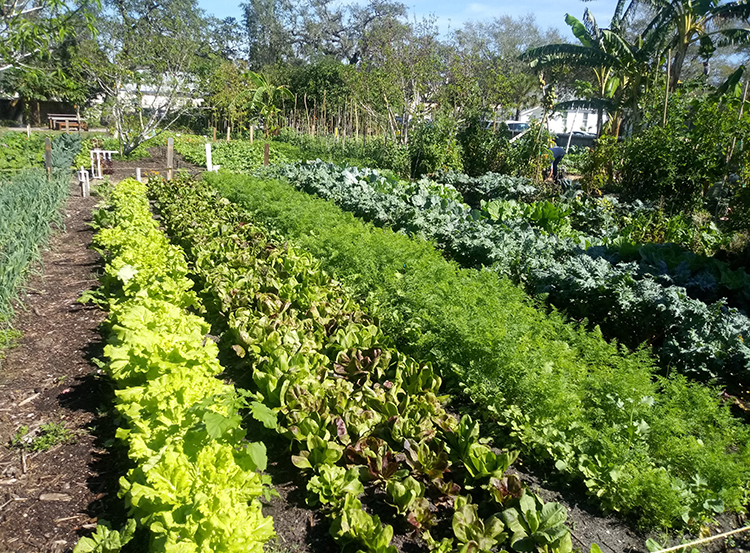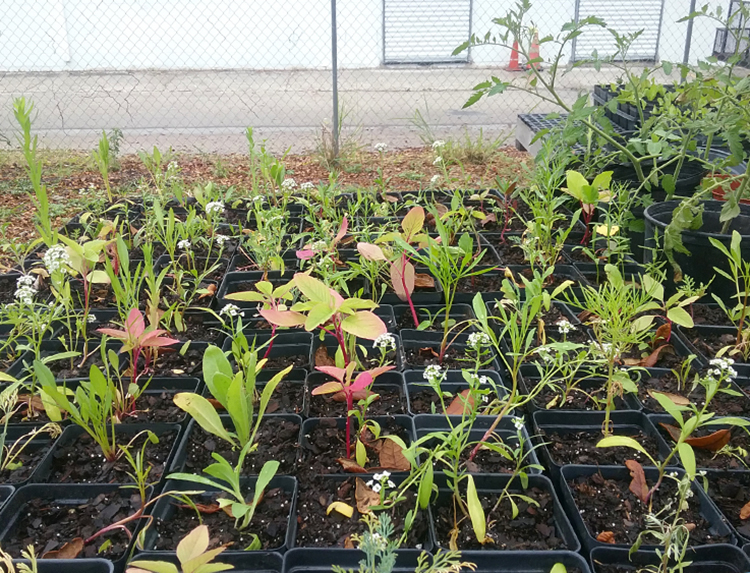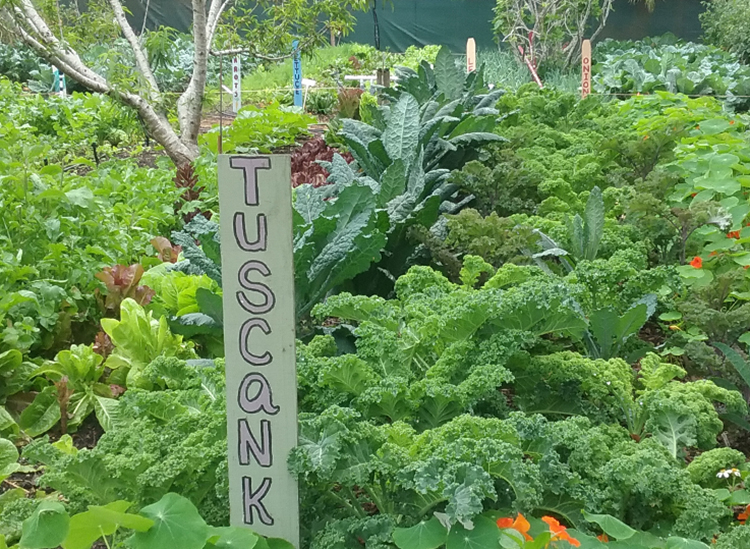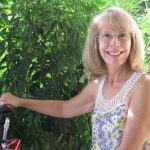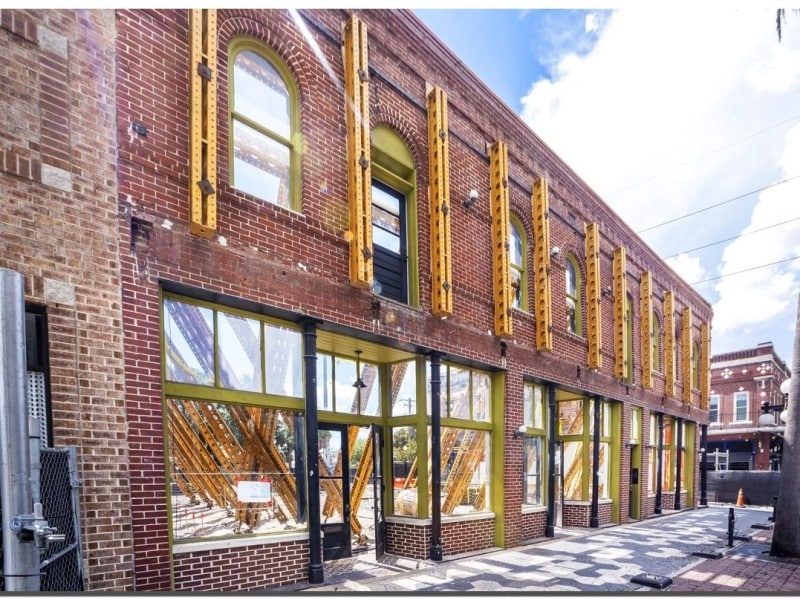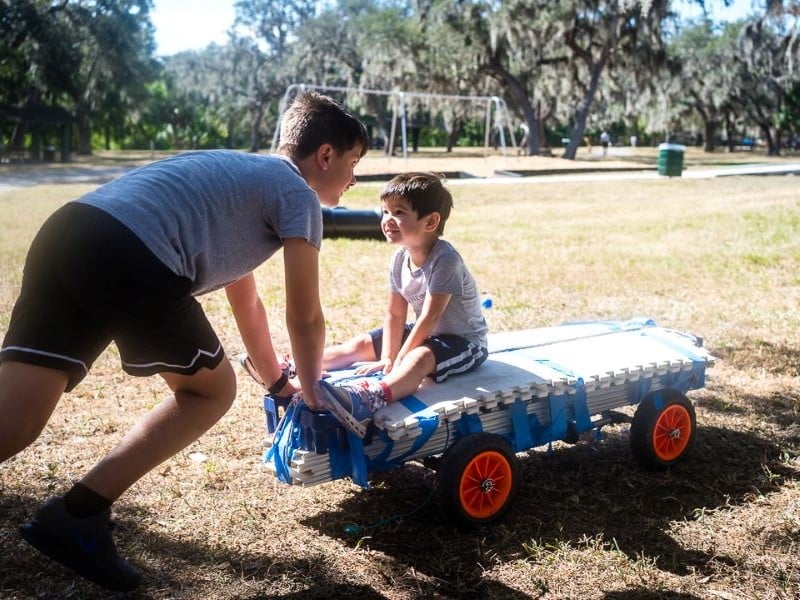St. Pete Land Trust to create tiny house community, urban farm
A St. Petersburg Charitable Land Trust is creating an innovative urban community that will combine affordable housing, an educational community garden, and a school for at-risk youth.
Not far from the interstate overpass in downtown St. Petersburg, on a street with houses in need of a little TLC, an amazing urban garden is taking shape. Enormous Swiss chard, Chinese cabbage, arugula, leeks, fennel, peppers, and tomatoes are lined up in rows on about a ¼ acre of land.
“We have about 40 different kinds of vegetables, herbs, and fruit trees,” says Emmanuel Roux, of the urban educational farm or “Urban Food Park” that he is cultivating in the 300 block of 15th Street North.
Roux is a former St. Pete restaurant owner and chef famous for his flourless chocolate cake (Gateau O’Chocolat). He’s also been a long-time local advocate for community gardens, permaculture and healthy, farm-to-table eating. Now he’s getting the chance to turn his passion into reality by developing an organic urban farm that will eventually have several interesting components, including an outdoor pavilion that seats 60 for special events and a commercial kitchen.
Roux hopes to host “tasting tours” in the garden to introduce people to vegetables and herbs they might never have tasted before. He also envisions cooking classes in the commercial kitchen, a flour mill for grinding grains and a brick wood-fired stove for making bread. Down the road, there may be the potential for developing a food incubator for small food-related startup companies in need of support and space.
The goal of the farm, says Roux is to be “a community resource and educational tool, to reconnect people to nature and where their food comes from.” He says his philosophy is healthy soil equals healthy food and that in turn, can create a healthy community.
Roux also sees the farm as the cornerstone of a visionary new enterprise being put together under the umbrella of a St. Petersburg Charitable Land Trust. The trust owns two acres of land on 15th Street between 5th Avenue North and Burlington Avenue North.
In addition to the farm, there are plans to build affordable housing and space for an expansion of SailFuture, an innovative program helping at-risk foster youth succeed.
According to Mark Lombardi, a spokesperson for the project, an anonymous donor has provided the funding to move forward on the concept.
This is not the first social enterprise located on the property. There have been several previous nonprofit entities; starting with Faith House, a residential and treatment program helping people overcome addiction, and more recently, Eco Village, a nonprofit organization encouraging sustainable living and urban agriculture.
Lombardi says the new project will continue to champion social advocacy issues around affordable housing, social connection, nutrition, and wellness.
“We have a unique opportunity to take a piece of land that is right here downtown and do something unique to facilitate access to affordable housing for a multi-generational group of people who share similar values and beliefs,” says Lombardi. “We hope to serve as a catalyst for that concept and make it a reality.”
A real urban pioneer
The land trust is working with various stakeholders interested in supporting the concept of the village, says Lombardi. “We are being very intentional and doing our research,” he says. “We see this as a really pioneering venture that could be a model for other areas of the country.”
Bill Reid, a general contractor and owner of Eire Contractors LLC, is serving as a liaison with the trust. He is helping oversee the permitting process with the City of St. Petersburg and is in charge of construction for the affordable housing component.
According to Reid, the group hopes to create a small community of energy-efficient tiny homes that will be leased to tenants on a long-term basis. Currently, the site is permitted for three tiny homes.
Defined as a building structure that is 500-square-feet or less, tiny homes are a hot topic that has fired up the imagination of people across the country. The second annual St. Petersburg Tiny Homes Festival took place in March and drew a record-breaking crowd interested in looking at more than 30 tiny structures and listening to speakers address a variety of topics on the trendy “tiny life movement.”
“Most people still think of tiny homes as mobile, but we are talking about creating permanent residential structures,” says Lombardi. “That opens up a whole new conversation about minimalism and affordability.”
The first tiny house the trust is building is actually not in the 15th Street neighborhood, says Reid. It’s located at 12th Avenue South.
Reid points out that the property, considered undesirable because of its location adjacent to Interstate 275, is an ideal demonstration for what’s possible in creating an attractive tiny home using the latest energy efficient green building materials.
“The home is just under 500 square feet and will include a second floor with spiral staircase and a metal roof,” says Reid. “It will also have nearly zero energy usage and be completely sound insulated to reduce highway traffic noise.”
Rather than use standard construction materials, the home is being built with the latest energy efficient green building idea – customized structural insulated panels or SIPs. The manufacturer, New Panel Homes, is based in Englewood, FL. According to the company’s website, the panels are manufactured with an insulating foam core sandwiched between structural facings. The home comes as a pre-engineered kit that is ready to assemble onsite.
“The house meets all the Florida building codes and it will be inexpensive to cool and heat,” says Reid. The Charitable Trust hopes to have the first home ready for occupancy by July.
Reid is also overseeing extensive renovations to an existing building on the 15th Street property that will house a satellite program for SailFuture.
Sailing to success
Mike Long is the founder and executive director of SailFuture, a St. Petersburg-based nonprofit that combines residential living, challenging sailing experiences, mentoring, job training, and education for high-risk teenage boys ages 13 to 17. All of the boys are in foster care and under the supervision of the Department of Children and Families.
Long founded SailFuture in 2013 as a Sarasota-based after-school mentorship program in partnership with New College of Florida and Booker High School.
“We had 10 college students, 10 high school students and a bunch of small sailboats that New College owned,” says Long. “Sailing was the tool we used to be able to work with a difficult teen population that can be hard to engage.”
In 2014, Long took the sailing mentorship program to the next level. He partnered with the Florida Department of Juvenile Justice to pilot a unique sailing-based intervention program that took a small group of boys around the coast of North Africa for three months.
The program was successful, and over the next few years, more than 30 teens participated in sailing adventures that ranged from three days around the coast of Florida to longer, three-month journeys.
Three years ago, SailFuture gained accreditation from the Pinellas County School Board to officially offer a custom-tailored, experienced-based high school education for boys enrolled in the program.
At the same time, Long obtained licensure by the Florida Department of Children and Families to operate a residential group home. He currently has one group home for boys in Pinellas Point at the southern tip of Pinellas County. Plans for a second home, in Lakewood Estates, also in Southern Pinellas, have been submitted to the city. Construction on that home is expected to start in early summer.
Long says he had a similar childhood to many of the young people he serves and can understand many of the challenges they face. But he was fortunate to have adults take an interest in him and steer him in a different direction. He went on to graduate from New College and was a 2013 Truman Scholar. He worked in Washington, D.C. for a while but decided to move back to Tampa Bay to work with troubled youth. Now he is partnering with the Charitable Land Trust to set up an expansion of SailFuture at the 15th Street location.
Long envisions building a permanent private technical high school for youth enrolled in SailFuture on the property there. He also hopes to develop affordable transitional housing for boys who have graduated from the program and are now living independently but still in need of mentoring, job support, and guidance.
It takes a village
There are still a few details to be worked out, but in the meantime, the garden is flourishing.
It took Roux and a team of volunteers, including students from Eckerd College, several months to transform the property, which had been overgrown with weeds and discarded items. Once the land was cleared, Roux says he brought in about 300 tons of organic material to “feed the soil and grow the right microbes.”
At the end of March, Salome Baczynsky and Florian Tapin, natives of Belgium and France respectively, were onsite planting transplanting seedlings into little plastic trays.
The two had recently completed their degree in architecture in Belgium and had applied for citizenship in Canada. While they were waiting to be approved, they were volunteering for several weeks at the 15th Street Agrihood farm through WWOOF, or Willing Workers On Organic Farms.
According to the organization’s website, WWOOF is an international exchange network where individuals volunteer their time working with organic farmers and growers in exchange for accommodations. Before coming to the St. Petersburg garden, Baczynsky and Tapin were staying at a farm in Spring Hill in Hernando County, FL. That experience led them to apply for an opening at the 15th Street Agrihood under the direction of Roux.
“It’s been a great experience and we really enjoy it here,” says Baczynsky. “We wanted someplace warmer than Canada to volunteer and we had never been to Florida. It was the perfect opportunity.”

